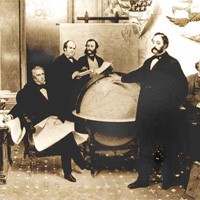The 1867 purchase of Alaska often raises the question: why did the U.S. buy Alaska? This acquisition marked a pivotal moment in American history, ending Russia’s presence in North America and solidifying the United States’ position as a Pacific power. This article delves into the historical context, motivations, and long-term implications of this significant transaction.
Russia’s Alaskan Ambitions and Decline
Russia’s interest in Alaska began in the early 18th century with Vitus Bering’s exploration of the Alaskan coast. The region’s abundant natural resources and sparse population attracted Russian fur traders and settlers. However, Russia faced challenges in establishing a strong foothold. The Crimean War drained resources and weakened Russia’s ability to maintain its Alaskan territory.
 Signing of the Alaska Treaty, 1867
Signing of the Alaska Treaty, 1867
The Sale and Seward’s Vision
Facing financial constraints and concerned about British expansion, Russia offered to sell Alaska to the United States in 1859. The American Civil War delayed the purchase, but Secretary of State William Seward, recognizing Alaska’s strategic importance, swiftly resumed negotiations after the war’s end. In 1867, the United States purchased Alaska from Russia for $7.2 million, a deal that initially faced public skepticism and was ridiculed as “Seward’s Folly.”
Alaska’s Transformation and Strategic Significance
Initially, the United States neglected its new territory. However, the discovery of gold in the Yukon in 1896 transformed Alaska into a gateway to the Klondike Gold Rush, validating Seward’s foresight. Alaska’s strategic value became undeniable during World War II, further solidifying its importance to the United States. Alaska eventually achieved statehood in 1959. The purchase of Alaska proved to be a shrewd long-term investment, securing access to vast resources and solidifying America’s presence in the Pacific Rim.
Conclusion: A Legacy of Strategic Vision
The purchase of Alaska exemplifies a significant historical event driven by geopolitical strategy and long-term vision. While initially met with skepticism, the acquisition ultimately proved to be a crucial decision, shaping the destiny of both the United States and the Alaskan territory. From resource wealth to strategic positioning, the reasons why the US bought Alaska continue to resonate in modern geopolitics.